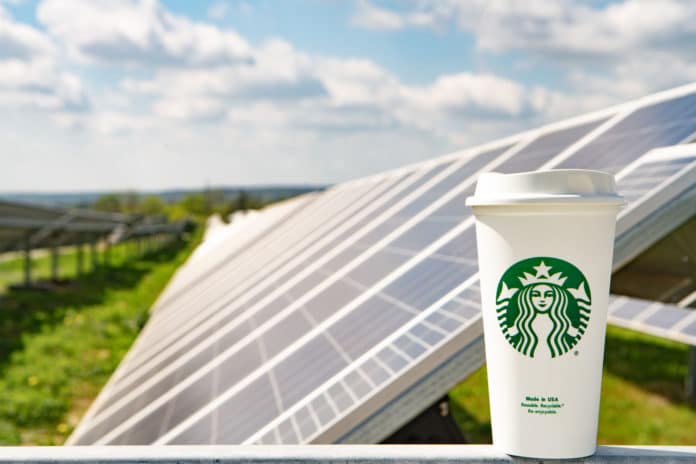Starbucks expanding solar, enough to power 360 Texas stores
HOUSTON (AP) — Starbucks Corp. has announced plans to expand its investment in solar farms and use the energy to power hundreds of its coffee-serving stores in Texas.
Seattle-based Starbucks on Monday announced the deal with Cypress Creek Renewables and U.S. Bank.
A statement says the companies are combining forces on solar farm operations throughout Texas. Terms weren’t released.
Two solar farms built and operated by Cypress Creek currently provide enough energy for the equivalent of 360 Starbucks in Texas, including sites in Houston, Dallas, Fort Worth, Plano and Arlington. Company officials say Starbucks is separately investing in six Cypress Creek-owned solar farms in Texas.
Starbucks and U.S. Bank earlier worked to develop and finance a solar farm in Maxton, North Carolina.
Starbucks is the number one purchaser of renewable electricity in its sector on the Environmental Protection Agency’s Green Power Partnership Retail Top 30i. The company is taking a regional to sustainability by investing in local projects to directly support the markets where it has stores, according to the company. This relationship with Cypress Creek and U.S. Bank is an example of that strategic approach at work.
With the final solar farm in the portfolio now producing energy, hundreds of Starbucks stores across Texas are now powered by two, 10-megawatt Cypress Creek-owned solar farms located in Wharton and Blossom, Texas. ENGIE Resources is providing full retail energy requirements, including a structure that provides budget certainty via a fixed price and a simple retail energy supply contract.
Starbucks is separately investing in six Cypress Creek-owned solar farms in Texas, representing 50 megawatts of solar energy. In total, the portfolio of eight projects announced today is reducing carbon emissions by an estimated 101,000 tons per year, the equivalent of planting nearly 2.5 million trees.
“At Starbucks, we are proud of our 30-year legacy in environmental leadership as we know the planet is our most important partner,” said Rebecca Zimmer, Starbucks director of global environmental impact. “Our long-standing commitment to renewable energy supports our greener retail initiative and demonstrates our aspiration to sustainable coffee, served sustainably. Now, we are investing in new, renewable energy projects in our store communities, which we know is something our partners and customers can appreciate for their local economy and for the environment.”
Cypress Creek is a leading developer, investor, builder and operator of solar energy generating assets in regulated and deregulated markets across the United States. The company has successfully developed more than 3.5 gigawatts of solar.
“Cypress Creek is thrilled to join forces with Starbucks, U.S. Bank and Engie to provide a locally-sourced solar product to energize Starbucks Texas stores,” said Matthew McGovern, CEO of Cypress Creek Renewables. “Starbucks and other forward-looking companies are carrying out their bold renewable energy targets, and Cypress Creek is proud to provide the innovative and tailored energy solutions needed to bring their vision to life.”
The U.S. Bancorp Community Development Corp. (USBCDC), the tax credit division of U.S. Bank, brought Cypress Creek and Starbucks together to facilitate the transaction and provided a portion of the tax equity investment. This is the second time Starbucks and U.S. Bank have worked together to develop and finance a solar project, having previously worked on a 47-megawatt solar farm in Maxton, NC that powers 600 Starbucks stores.
Chris Roetheli, business development officer with the USBCDC, said solar tax equity investments are increasing in popularity among non-traditional investors, like Starbucks.
“Starbucks is taking a unique approach – investing in solar farms regionally to support a specific group of its stores. This is a new concept and one that I think other companies are watching and may follow. It’s an interesting model that allows them to talk specifically about the impact of their investments,” Roetheli said.






